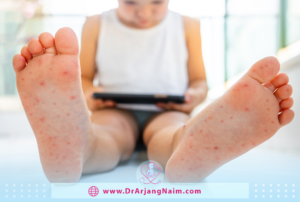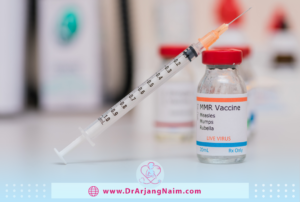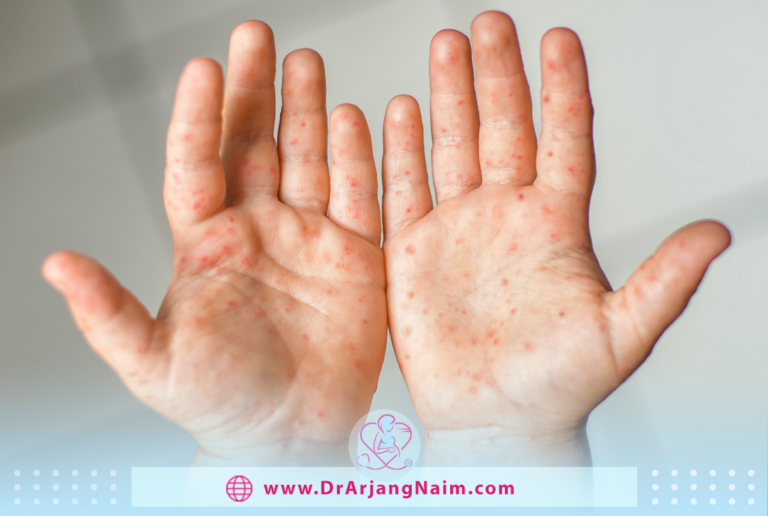Rubella is a contagious viral infection best known for its distinctive red rash. Although most people may experience mild or no symptoms, it can cause serious problems for unborn babies whose mothers become infected during pregnancy.
Rubella is similar to measles, but these two diseases share signs and symptoms, such as a red rash. It is caused by a virus different from measles and is less contagious or severe.
The measles-mumps-rubella (MMR) vaccine is safe and effective in preventing rubella. This vaccine provides lifelong protection against rubella.
In many countries, infection is rare or non-existent. However, because the vaccine is not widely used, the virus continues to cause serious problems for babies whose mothers are infected during pregnancy.

Symptoms
The hallmark symptom is a skin rash that usually starts on the face and spreads to the rest of the body. In young children, a rash is often the first symptom. In older children and adults, the rash can appear several days after the onset of other symptoms.
Up to 50 percent of people have no symptoms but can still spread to others.
Symptoms include:
- Urticaria
- Low fever
- Cough
- Sore throat
- Runny nose
- Headache
- Pink eye
- Joint pain
- Generally feeling unwell
- Swollen lymph nodes
Causes
Rubella is caused by a virus that spreads from person to person. It can spread when an infected person coughs or sneezes through direct contact with infected mucus from the nose and throat or the bloodstream from pregnant women to their unborn children.
An infected with the virus is contagious from about a week before the rash starts until about a week after the rash disappears. An infected person can spread the disease before the person knows they have it.
Rubella is rare in many countries because most children are vaccinated against the infection at an early age. However, the virus is still active in some parts of the world. This is something to consider before going abroad, especially if you are pregnant.
Complications
Rubella is a mild infection. Some women with rubella experience arthritis in the fingers, wrists, and knees, usually lasting about a month. In rare cases, rubella can cause an ear infection or inflammation of the brain.
However, if you are pregnant when you get rubella, the effects on your unborn child can be severe and, in some cases, fatal. More than 90% of babies born to mothers who had rubella in the first 12 weeks of pregnancy will have congenital rubella syndrome. This syndrome can cause one or more problems, including:
- Cataracts
- Deafness
- Growth delays
- Heart development problems
- Problems in the development of other organs
- Mental development and learning problems
The most significant risk to the fetus is in the first trimester, but exposure in late pregnancy is also dangerous.

Prevention of rubella
Prevention of rubella is primarily achieved through vaccination.
Vaccination against rubella
The rubella vaccine is a live attenuated, meaning it contains a weakened form of the rubella virus. When this weakened virus enters the body, it triggers an immune response. The body produces antibodies that recognize the virus and fight it. Once vaccinated, a person is usually protected against rubella for years, often for life.
The rubella vaccine is administered in most countries as part of routine childhood immunization programs. The exact timing of vaccination may vary slightly in different regions, but it is usually administered as a single dose or as part of a combination vaccine.
The importance of vaccination
Vaccination protects a person from getting rubella. When a high percentage of the population is vaccinated, it creates herd immunity, which helps protect people who cannot be vaccinated, such as infants and the immunocompromised.
Vaccination is important to prevent congenital rubella syndrome (CRS), a severe disease that can affect unborn babies.
Vaccine side effects
Most people do not experience any side effects from the vaccine. These can include the following:
- Arm pain at the injection site
- Fever
- Mild rash or redness at the injection site
Very few people experience:
- Temporary joint pain or stiffness
- Swelling of glands in the cheeks or neck
- Seizures that occur with fever
- Low levels of blood cells that help clot
- Rashes all over the body
- Serious allergic reaction (rare)

How is rubella diagnosed?
Rubella is typically diagnosed through blood tests.
- Rubella IgM antibody test: This test detects the presence of IgM antibodies, which the body produces in response to a recent infection. A positive IgM test indicates a current or recent rubella infection.
- Rubella IgG antibody test: This test detects the presence of IgG antibodies, which the body produces in response to a past infection. A positive IgG test indicates that the person has been infected with rubella and is likely immune.
A pregnant woman should immediately see her doctor if she is concerned about rubella. The doctor can order blood tests to determine whether she has been infected with the virus.
It is also important to note that rubella can sometimes be diagnosed based on symptoms. However, a blood test is the most reliable way to confirm a diagnosis.
Rubella and pregnancy
It is best to be protected against rubella before you become pregnant, as infection in the first trimester can cause serious illness or even death in your unborn baby. The most common cause of congenital deafness is rubella infection during pregnancy. Some women who contract rubella during pregnancy have miscarriages. In other cases, the baby does not survive long after birth.
If you are trying to get pregnant, check your vaccination records to ensure you received the MMR vaccine. You should wait at least four weeks after getting the vaccine to get pregnant.
Congenital rubella syndrome (CRS)
CRS is a condition that occurs when a child is infected with the rubella virus during pregnancy through the mother. If you get rubella early in pregnancy, you may have a miscarriage or stillbirth, birth defects, or hearing loss. The risk of the child contracting the rubella virus and being born with serious related conditions is higher in the first trimester of pregnancy (up to week 12) and decreases after that.
Management and treatment
There is no specific medicine to treat rubella. It usually gets better on its own. You can treat symptoms at home with over-the-counter medications. The health care provider may suggest quarantine away from others to reduce the spread of rubella.
How do I manage the symptoms of rubella?
You can often control rubella symptoms at home with over-the-counter medications such as acetaminophen or cough and cold medicines. Ask your healthcare provider about the best way to treat your symptoms. Consult your pediatrician before giving your child rubella medications.
How is congenital rubella syndrome treated?
Congenital rubella syndrome treatment methods depend on its severity. Some diseases can be treated with medicine or surgery. Other injuries are permanent and can only be managed to improve quality of life.
The bottom line
Rubella is often a mild disease but can be dangerous in pregnant women. If you are pregnant and get it, your baby is at risk for organ damage and other life-threatening conditions. Vaccination greatly reduces the risk of catching rubella and spreading it to others.
Additional questions
- How do we differentiate between rubella and measles?
Rubella and measles can be difficult to differentiate, especially for those without medical training. Both infections can cause a rash, fever, and swollen lymph nodes. However, rubella often has a lighter pink rash, swollen lymph nodes in the neck and behind the ears, and a milder fever. Measles typically has a darker red rash, swollen lymph nodes in various locations, and a higher fever. Additionally, measles is often accompanied by cough, runny nose, and watery eyes. If you suspect either infection, consulting a doctor is essential for diagnosis and treatment.
- What is rubella medicine?
It’s a virus so that antibiotics won’t work. Often, the infection in children is so mild that it does not require treatment. You can reduce your child’s fever and relieve pain with pain relievers such as acetaminophen or children’s ibuprofen.
- What is the IgM antibody?
IgM antibody is a type of antibody that is produced by the immune system in response to a recent infection. It is one of the first antibodies to appear in the bloodstream after exposure to a new pathogen.
- What does the MMR vaccine do?
The MMR vaccine protects against measles, mumps, and rubella, highly contagious viral infections that can cause serious complications, especially in children and pregnant women.
- What diseases are there currently vaccines for?
Vaccines are available for a wide range of diseases, protecting against both bacterial and viral infections. Here are some of the most common diseases with corresponding vaccines:
- Measles, Mumps, Rubella (MMR)
- Polio
- Influenza (Flu)
- Chickenpox (Varicella)
- Human Papillomavirus (HPV)
- Rabies
- Ebola
- COVID-19
- Diphtheria
- Tetanus
- Pertussis
- Meningitis
- Pneumonia
References
https://www.mayoclinic.org/diseases-conditions/rubella/diagnosis-treatment/drc-20377315
https://www.webmd.com/a-to-z-guides/what-is-rubella
https://www.betterhealth.vic.gov.au/health/conditionsandtreatments/rubella
https://my.clevelandclinic.org/health/diseases/17798-rubella




